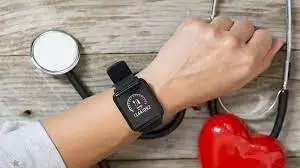- Home
- Medical news & Guidelines
- Anesthesiology
- Cardiology and CTVS
- Critical Care
- Dentistry
- Dermatology
- Diabetes and Endocrinology
- ENT
- Gastroenterology
- Medicine
- Nephrology
- Neurology
- Obstretics-Gynaecology
- Oncology
- Ophthalmology
- Orthopaedics
- Pediatrics-Neonatology
- Psychiatry
- Pulmonology
- Radiology
- Surgery
- Urology
- Laboratory Medicine
- Diet
- Nursing
- Paramedical
- Physiotherapy
- Health news
- Fact Check
- Bone Health Fact Check
- Brain Health Fact Check
- Cancer Related Fact Check
- Child Care Fact Check
- Dental and oral health fact check
- Diabetes and metabolic health fact check
- Diet and Nutrition Fact Check
- Eye and ENT Care Fact Check
- Fitness fact check
- Gut health fact check
- Heart health fact check
- Kidney health fact check
- Medical education fact check
- Men's health fact check
- Respiratory fact check
- Skin and hair care fact check
- Vaccine and Immunization fact check
- Women's health fact check
- AYUSH
- State News
- Andaman and Nicobar Islands
- Andhra Pradesh
- Arunachal Pradesh
- Assam
- Bihar
- Chandigarh
- Chattisgarh
- Dadra and Nagar Haveli
- Daman and Diu
- Delhi
- Goa
- Gujarat
- Haryana
- Himachal Pradesh
- Jammu & Kashmir
- Jharkhand
- Karnataka
- Kerala
- Ladakh
- Lakshadweep
- Madhya Pradesh
- Maharashtra
- Manipur
- Meghalaya
- Mizoram
- Nagaland
- Odisha
- Puducherry
- Punjab
- Rajasthan
- Sikkim
- Tamil Nadu
- Telangana
- Tripura
- Uttar Pradesh
- Uttrakhand
- West Bengal
- Medical Education
- Industry
Cuffless blood pressure measuring devices convenient but accuracy needs to be validated

Cuffless blood pressure measurement is a fast catching trend with improved hypertension awareness. However the accuracy of these new devices has not yet been validated and therefore they are not suitable for clinical use at present, concludes a new statement from the European Society of Hypertension.
Cuffless BP devices are convenient and have considerable potential for changing the diagnosis and management of hypertension, but their accuracy have to be validated.
The study has been published in the Journal of Hypertension.
Much cuffless blood pressure (BP) measuring devices are currently on the market claiming that they provide accurate BP measurements. These technologies have considerable potential to improve the awareness, treatment, and management of hypertension. However, recent guidelines by the European Society of Hypertension do not recommend cuffless devices for the diagnosis and management of hypertension.
This statement by the European Society of Hypertension Working Group on BP Monitoring and Cardiovascular Variability presents the types of cuffless BP technologies, issues in their validation, and recommendations for clinical practice.
Cuffless BP monitors constitute a wide and heterogeneous group of novel technologies and devices with different intended uses. Cuffless BP devices have specific accuracy issues, which render the established validation protocols for cuff BP devices inadequate for their validation. In 2014, the Institute of Electrical and Electronics Engineers published a standard for the validation of cuffless BP devices, and the International Organization for Standardization is currently developing another standard. The validation of cuffless devices should address issues related to the need of individual cuff calibration, the stability of measurements post-calibration, the ability to track BP changes, and the implementation of machine learning technology. Clinical field investigations may also be considered and issues regarding the clinical implementation of cuffless BP readings should be investigated.
Thus, Cuffless BP devices have considerable potential for changing the diagnosis and management of hypertension. However, fundamental questions regarding their accuracy, performance, and implementation need to be carefully addressed before they can be recommended for clinical use.
Reference:
Stergiou, George S.a et al. Cuffless blood pressure measuring devices: review and statement by the European Society of Hypertension Working Group on Blood Pressure Monitoring and Cardiovascular Variability, Journal of Hypertension: June 17, 2022 - Volume - Issue - 10.1097/HJH.0000000000003224 doi: 10.1097/HJH.0000000000003224
Dr. Shravani Dali has completed her BDS from Pravara institute of medical sciences, loni. Following which she extensively worked in the healthcare sector for 2+ years. She has been actively involved in writing blogs in field of health and wellness. Currently she is pursuing her Masters of public health-health administration from Tata institute of social sciences. She can be contacted at editorial@medicaldialogues.in.
Dr Kamal Kant Kohli-MBBS, DTCD- a chest specialist with more than 30 years of practice and a flair for writing clinical articles, Dr Kamal Kant Kohli joined Medical Dialogues as a Chief Editor of Medical News. Besides writing articles, as an editor, he proofreads and verifies all the medical content published on Medical Dialogues including those coming from journals, studies,medical conferences,guidelines etc. Email: drkohli@medicaldialogues.in. Contact no. 011-43720751


